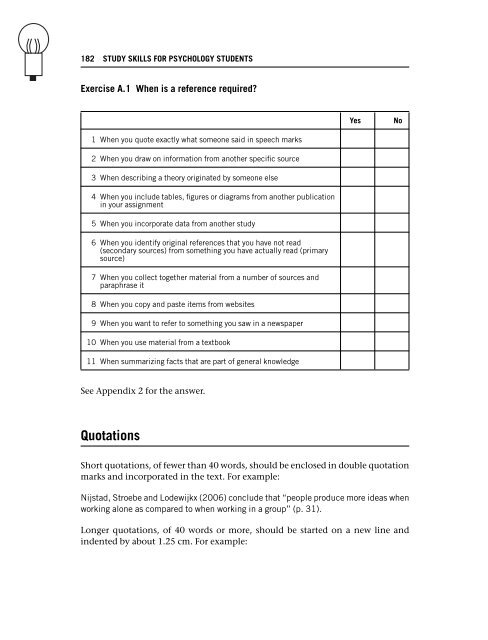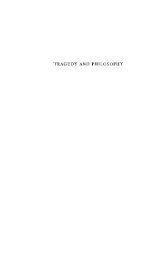- Page 1 and 2:
Successful Studying Study Skills fo
- Page 4 and 5:
Study Skills for Psychology Student
- Page 6:
For Georgina Brennan, Julia Henders
- Page 9 and 10:
viii CONTENTS 4.5 Preparing and pre
- Page 12:
Skills for Successful Study series
- Page 15 and 16:
xiv SERIES EDITOR’S PREFACE This
- Page 17 and 18:
2 STUDY SKILLS FOR PSYCHOLOGY STUDE
- Page 19 and 20:
4 STUDY SKILLS FOR PSYCHOLOGY STUDE
- Page 21 and 22:
6 STUDY SKILLS FOR PSYCHOLOGY STUDE
- Page 23 and 24:
8 STUDY SKILLS FOR PSYCHOLOGY STUDE
- Page 25 and 26:
10 STUDY SKILLS FOR PSYCHOLOGY STUD
- Page 27 and 28:
12 STUDY SKILLS FOR PSYCHOLOGY STUD
- Page 29 and 30:
14 STUDY SKILLS FOR PSYCHOLOGY STUD
- Page 31 and 32:
16 STUDY SKILLS FOR PSYCHOLOGY STUD
- Page 33 and 34:
18 STUDY SKILLS FOR PSYCHOLOGY STUD
- Page 35 and 36:
20 STUDY SKILLS FOR PSYCHOLOGY STUD
- Page 37 and 38:
22 STUDY SKILLS FOR PSYCHOLOGY STUD
- Page 39 and 40:
24 STUDY SKILLS FOR PSYCHOLOGY STUD
- Page 41 and 42:
26 STUDY SKILLS FOR PSYCHOLOGY STUD
- Page 43 and 44:
28 STUDY SKILLS FOR PSYCHOLOGY STUD
- Page 45 and 46:
30 STUDY SKILLS FOR PSYCHOLOGY STUD
- Page 47 and 48:
32 STUDY SKILLS FOR PSYCHOLOGY STUD
- Page 49 and 50:
34 STUDY SKILLS FOR PSYCHOLOGY STUD
- Page 51 and 52:
36 STUDY SKILLS FOR PSYCHOLOGY STUD
- Page 53 and 54:
38 STUDY SKILLS FOR PSYCHOLOGY STUD
- Page 55 and 56:
40 STUDY SKILLS FOR PSYCHOLOGY STUD
- Page 57 and 58:
42 STUDY SKILLS FOR PSYCHOLOGY STUD
- Page 59 and 60:
44 STUDY SKILLS FOR PSYCHOLOGY STUD
- Page 61 and 62:
46 STUDY SKILLS FOR PSYCHOLOGY STUD
- Page 63 and 64:
48 STUDY SKILLS FOR PSYCHOLOGY STUD
- Page 65 and 66:
50 STUDY SKILLS FOR PSYCHOLOGY STUD
- Page 67 and 68:
52 STUDY SKILLS FOR PSYCHOLOGY STUD
- Page 69 and 70:
54 STUDY SKILLS FOR PSYCHOLOGY STUD
- Page 71 and 72:
56 STUDY SKILLS FOR PSYCHOLOGY STUD
- Page 73 and 74:
58 STUDY SKILLS FOR PSYCHOLOGY STUD
- Page 75 and 76:
60 STUDY SKILLS FOR PSYCHOLOGY STUD
- Page 77 and 78:
62 STUDY SKILLS FOR PSYCHOLOGY STUD
- Page 79 and 80:
64 STUDY SKILLS FOR PSYCHOLOGY STUD
- Page 81 and 82:
66 STUDY SKILLS FOR PSYCHOLOGY STUD
- Page 83 and 84:
68 STUDY SKILLS FOR PSYCHOLOGY STUD
- Page 85 and 86:
70 STUDY SKILLS FOR PSYCHOLOGY STUD
- Page 87 and 88:
72 STUDY SKILLS FOR PSYCHOLOGY STUD
- Page 89 and 90:
74 STUDY SKILLS FOR PSYCHOLOGY STUD
- Page 91 and 92:
76 STUDY SKILLS FOR PSYCHOLOGY STUD
- Page 93 and 94:
78 STUDY SKILLS FOR PSYCHOLOGY STUD
- Page 95 and 96:
80 STUDY SKILLS FOR PSYCHOLOGY STUD
- Page 97 and 98:
82 STUDY SKILLS FOR PSYCHOLOGY STUD
- Page 99 and 100:
84 STUDY SKILLS FOR PSYCHOLOGY STUD
- Page 105 and 106:
90 STUDY SKILLS FOR PSYCHOLOGY STUD
- Page 107 and 108:
92 STUDY SKILLS FOR PSYCHOLOGY STUD
- Page 109 and 110:
94 STUDY SKILLS FOR PSYCHOLOGY STUD
- Page 111 and 112:
96 STUDY SKILLS FOR PSYCHOLOGY STUD
- Page 113 and 114:
98 STUDY SKILLS FOR PSYCHOLOGY STUD
- Page 115 and 116:
100 STUDY SKILLS FOR PSYCHOLOGY STU
- Page 117 and 118:
102 STUDY SKILLS FOR PSYCHOLOGY STU
- Page 119 and 120:
104 STUDY SKILLS FOR PSYCHOLOGY STU
- Page 121 and 122:
106 STUDY SKILLS FOR PSYCHOLOGY STU
- Page 123 and 124:
108 STUDY SKILLS FOR PSYCHOLOGY STU
- Page 125 and 126:
110 STUDY SKILLS FOR PSYCHOLOGY STU
- Page 127 and 128:
112 STUDY SKILLS FOR PSYCHOLOGY STU
- Page 129 and 130:
114 STUDY SKILLS FOR PSYCHOLOGY STU
- Page 131 and 132:
116 STUDY SKILLS FOR PSYCHOLOGY STU
- Page 133 and 134:
118 STUDY SKILLS FOR PSYCHOLOGY STU
- Page 135 and 136:
120 STUDY SKILLS FOR PSYCHOLOGY STU
- Page 137 and 138:
122 STUDY SKILLS FOR PSYCHOLOGY STU
- Page 139 and 140:
124 STUDY SKILLS FOR PSYCHOLOGY STU
- Page 141 and 142:
126 STUDY SKILLS FOR PSYCHOLOGY STU
- Page 143 and 144:
128 STUDY SKILLS FOR PSYCHOLOGY STU
- Page 145 and 146: 130 STUDY SKILLS FOR PSYCHOLOGY STU
- Page 147 and 148: 132 STUDY SKILLS FOR PSYCHOLOGY STU
- Page 149 and 150: 134 STUDY SKILLS FOR PSYCHOLOGY STU
- Page 151 and 152: 136 STUDY SKILLS FOR PSYCHOLOGY STU
- Page 153 and 154: 138 STUDY SKILLS FOR PSYCHOLOGY STU
- Page 155 and 156: 140 STUDY SKILLS FOR PSYCHOLOGY STU
- Page 157 and 158: 142 STUDY SKILLS FOR PSYCHOLOGY STU
- Page 159 and 160: 144 STUDY SKILLS FOR PSYCHOLOGY STU
- Page 161 and 162: 146 STUDY SKILLS FOR PSYCHOLOGY STU
- Page 163 and 164: 148 STUDY SKILLS FOR PSYCHOLOGY STU
- Page 165 and 166: 150 STUDY SKILLS FOR PSYCHOLOGY STU
- Page 167 and 168: 152 STUDY SKILLS FOR PSYCHOLOGY STU
- Page 169 and 170: 154 STUDY SKILLS FOR PSYCHOLOGY STU
- Page 171 and 172: 156 STUDY SKILLS FOR PSYCHOLOGY STU
- Page 173 and 174: 158 STUDY SKILLS FOR PSYCHOLOGY STU
- Page 175 and 176: 160 STUDY SKILLS FOR PSYCHOLOGY STU
- Page 177 and 178: 162 STUDY SKILLS FOR PSYCHOLOGY STU
- Page 179 and 180: 164 SUCCESSFUL STUDYING Assessing t
- Page 181 and 182: 166 SUCCESSFUL STUDYING Networking
- Page 183 and 184: 168 SUCCESSFUL STUDYING Using the u
- Page 185 and 186: 170 SUCCESSFUL STUDYING ‘Chartere
- Page 187 and 188: 172 SUCCESSFUL STUDYING members, Th
- Page 189 and 190: 174 SUCCESSFUL STUDYING 6.6 Working
- Page 191 and 192: 176 SUCCESSFUL STUDYING 6.8 Longer
- Page 193 and 194: 178 STUDY SKILLS FOR PSYCHOLOGY STU
- Page 195: 180 STUDY SKILLS FOR PSYCHOLOGY STU
- Page 199 and 200: Appendix 2 Answers to exercises Exe
- Page 201 and 202: Appendix 3 Acronyms and abbreviatio
- Page 203 and 204: Appendix 4 Glossary (See also Appen
- Page 205 and 206: 190 STUDY SKILLS FOR PSYCHOLOGY STU
- Page 207 and 208: 192 STUDY SKILLS FOR PSYCHOLOGY STU
- Page 209 and 210: 194 STUDY SKILLS FOR PSYCHOLOGY STU
- Page 211 and 212: 196 STUDY SKILLS FOR PSYCHOLOGY STU
- Page 213 and 214: 198 STUDY SKILLS FOR PSYCHOLOGY STU
- Page 215 and 216: 200 STUDY SKILLS FOR PSYCHOLOGY STU
- Page 217 and 218: 202 STUDY SKILLS FOR PSYCHOLOGY STU
- Page 219 and 220: 204 STUDY SKILLS FOR PSYCHOLOGY STU
- Page 221 and 222: 206 STUDY SKILLS FOR PSYCHOLOGY STU
- Page 223 and 224: 208 STUDY SKILLS FOR PSYCHOLOGY STU
- Page 225 and 226: 210 STUDY SKILLS FOR PSYCHOLOGY STU
- Page 227 and 228: 212 STUDY SKILLS FOR PSYCHOLOGY STU
- Page 229 and 230: References Aserinsky, E., & Kleitma
- Page 231 and 232: 216 STUDY SKILLS FOR PSYCHOLOGY STU
- Page 233 and 234: 218 INDEX Blindsight, 189 Body mass
- Page 235 and 236: 220 INDEX GBR see Graduate basis fo
- Page 237 and 238: 222 INDEX Phenomenology, 196 Piaget
- Page 239 and 240: 224 INDEX t-test, 209 Turnitin, 84-






